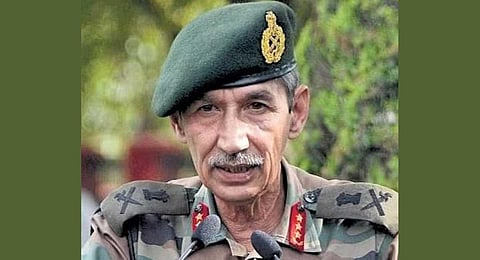

BENGALURU: The Army needs to go back to the drawing board and review the Standard Operating Procedures (SOPs) on counter insurgency operations in Poonch and Rajouri areas, retired Lieutenant General Deependra Singh Hooda told this paper.
Regarding the spike in Army and civilian casualties due to militancy in the Pir Panjal region, the former General Officer Commanding-in-Chief of the Northern Command said that there seems to be a disconnect between the civilians — the tribal Gujjars-Bakharwals — and the Army because of which ground intelligence on infiltration of foreign terrorists is drying up.
“There seems to be some laxity in procedures, which may have developed during the long militancy-free period (Poonch, Rajouri were declared militancy free by the Jammu and Kashmir police in 2011). How much did we lose out on the local connect when nothing was happening?” asked the Army veteran. “There are stringent counter insurgency SOPs. Besides revamping ground intelligence, and investing in sources and assets who give us actionable intelligence, the Army needs to review the SOPs on movement of troops, whether they need additional troops in the region along with better protected bullet-proof vehicles,” he said.
While the Kashmir Valley has been quiet, there has been a spate of terrorist activities in the Poonch-Rajouri region since 2021, in which the Army bore the maximum number of casualties. On December 21, four soldiers died and three others were injured when their vehicles were ambushed by terrorists at Dhatyar Morh in the Surankote area of Poonch.
Following the attack, three Gujjar tribals, who were allegedly picked up by the Army for questioning, were found dead near the attack site the next day, which infuriated the Gujjar-Bakerwal community. The mobile internet was shut down after the incident.
On December 24, the Army, in a swift damage control measure, removed the brigade commander and three other officers of 13 Rashtriya Rifles and the Jammu and Kashmir police registered an FIR against unknown persons under Section 302 of the Indian Penal Code for murder. Defence Minister Rajnath Singh, accompanied by Lt Governor Manoj Sinha and Chief of Army Staff General Manoj Pande on December 27 visited Poonch sector to review the security situation and visited the families of the three deceased civilians and assured them speedy justice.
“Gujjar-Bakharwals are nomads and have traditionally supported the Indian Army and have been one of the biggest reasons behind the roll back of insurgency from Jammu,” said the Army veteran. Rukhsana Kausar KC, a young Gujjar woman from Upper Kalsi, had shot down a Lashkar-e-Toiba militant in Rajouri district in 2009.
Throughout the year, these nomadic communities move along with their herds of sheep between the Kashmir Valley and Poonch, Rajouri in Pir Panjal belt and carry very useful information. “There is an urgent need to build back the old connection with the community. They are the eyes and ears of the Army,” Hooda said.